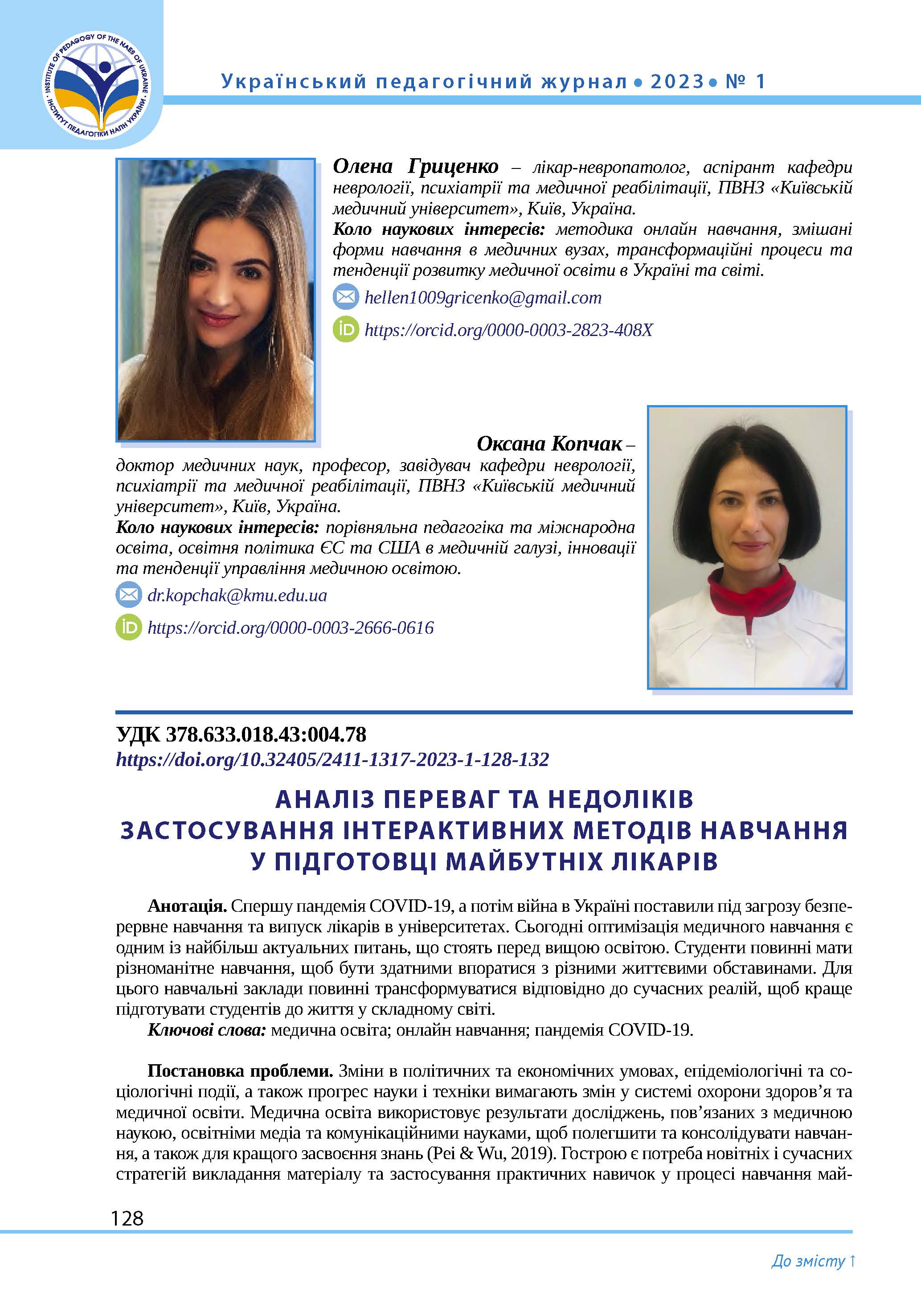Abstract
Changes in political and economic conditions, epidemiological and sociological events, as well as the progress of science and technology require changes in the health care system and medical education. Medical education uses the results of research related to medical science, educational media and communication sciences to facilitate and consolidate learning, as well as for better assimilation of knowledge. There is an acute need for the latest and modern strategies for teaching material and applying practical skills in the process of training a future doctor. It is known that the quality of medical services and the effectiveness of the work of medical personnel depends primarily on the quality of the education received. First, the COVID-19 pandemic, and then the war in Ukraine, jeopardized the continuous training and graduation of doctors at universities. Today, optimization of medical education is one of the most urgent issues facing higher education. Students should have a variety of learning to be able to cope with different life circumstances. For this, educational institutions must be transformed in accordance with modern realities in order to better prepare students for life in a complex world. Thanks to the rapid development of technology and science, students are able to learn throughout their lives and master clinical thinking. This type of training enables them to adapt to changing conditions. Online education, along with a number of advantages, has significant disadvantages, especially in medical education when studying clinical disciplines. Limiting the normal learning process will have a long-term negative impact on the traditional medical education system and will have long-term consequences after COVID-19. To improve online learning, which is likely to become an integral part of education in emergency conditions, new approaches such as problem-based learning and team-based learning should be more often introduced into the educational process, which promotes better student involvement in the learning process and formation of clinical thinking.
References
Al-Balas, M., Al-Balas, H. I., Jaber, H., Obeidat, K., Al-Balas, H. I., Aborajooh, E., Al-Taher, R., & Al-Balas, B. (2020). Distance learning in clinical medical education amid COVID-19 pandemic in Jordan: current situation, challenges, and perspectives. BMC Medical Education, 20(1). https://doi.org/10.1186/s12909-020-02257-4 (in English).
Alsoufi, A., Alsuyihili, A., Msherghi, A., Elhadi, A., Atiyah, H., Ashini, A., Ashwieb, A., Ghula, M., Hasan, H. B., Abudabuos, S., Alameen, H., Abokhdhir, T., Anaiba, M., Nagib, T., Shuwayyah, A., Benothman, R., Arrefae, G., Alkhwayildi, A., Alhadi, A., Elhadi, M. (2020). Impact of the COVID-19 pandemic on medical education: Medical students’ knowledge, attitudes, and practices regarding electronic learning. PLOS ONE, 15(11), e0242905. https://doi.org/10.1371/journal.pone.0242905 (in English).
Buja, L. M. (2019). Medical education today: all that glitters is not gold. BMC Medical Education, 19(1). https://doi.org/10.1186/s12909-019-1535-9 (in English).
Dost, S., Hossain, A., Shehab, M., Abdelwahed, A., & Al-Nusair, L. (2020). Perceptions of medical students towards online teaching during the COVID-19 pandemic: a national cross-sectional survey of 2721 UK medical students. BMJ Open, 10(11), e042378. https://doi.org/10.1136/bmjopen-2020-042378 (in English).
Ewell, S. N., Josefson, C. C., & Ballen, C. J. (2022). Why Did Students Report Lower Test Anxiety during the COVID-19 Pandemic?. Journal of microbiology & biology education, 23(1), e00282-21. https://doi.org/10.1128/jmbe.00282-21 (in English).
Gül, H., Gül, S. S., Kaya, E., & Alican, A. (2010). Main trends in the world of higher education, internationalization and institutional autonomy. Procedia - Social and Behavioral Sciences, 9, 1878–1884. https://doi.org/10.1016/j.sbspro.2010.12.417 (in English).
Kennedy, C., Lilley, P., Kiss, L., Littvay, L., & Harden, R. M. (2013). Curriculum trends in medical education in Europe in the 21st century. Dundee: Association for Medical Education in Europe (AMEE)/MEDINE2. (in English).
Pei, L., & Wu, H. (2019). Does online learning work better than offline learning in undergraduate medical education? A systematic review and meta-analysis. Medical Education Online, 24(1), 1666538. https://doi.org/10.1080/10872981.2019.1666538 (in English).
O’Doherty, D., Dromey, M., Lougheed, J., Hannigan, A., & McGrath, D. (2018). Barriers and solutions to online learning in medical education – an integrative review. BMC Medical Education, 18(1). https://doi.org/10.1186/s12909-018-1240-0 (in English).
Odintsova, T. A., Kopchak, O. O., Bachinskaya, N., Ivniev, B. B., & Pokanevych, O. V. (2022). Pros and cons of remote medical education in Ukraine in terms of COVID-19 pandemics. Informatics in Medicine Unlocked, 32, 101051. https://doi.org/10.1016/j.imu.2022.101051 (in English).
Palvia, S. C. J., Aeron, P., Gupta, P. C., Mahapatra, D., Parida, R., Rosner, R., & Sindhi, S. (2018). Online Education: Worldwide Status, Challenges, Trends, and Implications. Journal of Global Information Technology Management, 21(4), 233–241. https://doi.org/10.1080/1097198x.2018.1542262 (in English).
Rajabi, F., Majdzadeh, R., & Ziaee, S. A. (2011). Trends in medical education, an example from a developing country. Archives of Iranian medicine, 14(2), 132–138. (in English).
Rossini, T. S. S., Amaral, M. M. D., & Santos, E. (2021). The viralization of online education: Learning beyond the time of the coronavirus. Prospects, 51(1–3), 285–297. https://doi.org/10.1007/s11125-021-09559-5 (in English).
Said, J. T., & Schwartz, A. W. (2021). Remote Medical Education: Adapting Kern’s Curriculum Design to Tele-teaching. Medical Science Educator, 31(2), 805–812. https://doi.org/10.1007/s40670-020-01186-7 (in English).
Shehata, M., Abouzeid, E., Wasfy, N. F., Abdelaziz, A. M., Wells, R. E., & Ahmed, S. F. (2020). Medical Education Adaptations Post COVID-19: An Egyptian Reflection. Journal of Medical Education and Curricular Development, 7. https://doi.org/10.1177/2382120520951819 (in English).

This work is licensed under a Creative Commons Attribution-NonCommercial-ShareAlike 4.0 International License.


